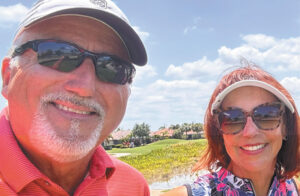
Sometimes, tragedy can lead to unexpected blessings. For Susan Myers of Bonita Springs, the sudden loss of her brother became the catalyst that ultimately saved her life. What began as a grief-driven health check turned into an eight-week journey from lung cancer diagnosis to complete cure.
“Had it not been for my brother’s untimely passing, I would never have thought to get that test,” Susan says.
After her brother Don died unexpectedly just before Thanksgiving, his doctor recommended calcium CT scans for Susan and her sister to assess heart health. Susan’s heart was fine—but the scan revealed a suspicious spot on her right lung.
When Routine Screening Reveals the Unexpected
Susan’s story highlights a growing trend in cancer detection: incidental findings. Krista Marzano, a board-certified nurse practitioner at Lee Health’s Advanced Lung Care Center, explains, “We get a lot of referrals from heart scans or other different scans that people are having done for unrelated reasons to their lungs.”
What appeared as a small “smear” on Susan’s lung in December had grown into a concerning nodule by January. A follow-up scan confirmed the need for immediate action.
The Power of Coordinated Care
At Lee Health’s Advanced Lung Care Center, patients receive what Marzano calls a “concierge service.” Her team handles scheduling, education, and coordination so patients can focus on healing.
“Once the orders get placed, my team gets everything situated and scheduled in real time,” Krista says. “We educate the patients on upcoming procedures, what they can expect, when to expect it, and then they just have to show up and take care of themselves.”
Susan recalls how quickly things moved: “Everything was in multiples of six days, eight days, three days. It just moved along.”
Technology That Changes the Game
A key part of Susan’s care was the ION bronchoscopy system, a minimally invasive lung biopsy technique that also stages the disease by checking lymph nodes.
“The ION bronchoscopy reduces the risk of complications compared to the alternative type of biopsy,” Krista says. “We can provide patients with answers within 10 to 15 days after their first office visit.”
This single procedure under anesthesia yields more diagnostic information than traditional methods, allowing for faster, more accurate treatment planning.
The Emotional Journey
Susan’s diagnosis was a shock. She had no smoking history or family cancer history. “I was just in shock. I just showed it to my husband. It’s cancer. The big ‘C’,” she recalls.
She experienced sleepless nights and anxiety, often researching her condition online. Krista says this emotional toll is common: “Any time you hear cancer, your brain just shuts off. We want to be the calm in the chaos.”
From Diagnosis to Cure in Eight Weeks
Susan’s journey—from initial consultation to surgery and recovery—spanned just eight weeks, from March 12 to April 23. Her lobectomy revealed clean margins and 12 lymph nodes free of cancer.
“I cried for 15 minutes,” Susan says of receiving her cancer-free results.
The Importance of Early Detection
Susan’s case underscores a vital truth: lung cancer is highly curable when caught early.
“Once the cancer is resected, as long as the margins are clear, the patient is considered cured,” Krista explains. “Lung cancer is the deadliest form of cancer. But if we catch it early, the prognosis and survival rate are significantly increased.”
Expanding Screening Efforts
To catch more cases early, the Center screens individuals with a 20-pack-year smoking history or current smokers. They also monitor incidental nodules found on chest imaging.
A dashboard system alerts primary care providers when scans detect nodules six millimeters or larger. “It’s just a safety net for the patients,” Krista says. “If nobody talks to you about the nodule—which happens unfortunately often—we have a safety net.”
A Guardian Angel’s Gift
Today, Susan is cancer-free and continues regular surveillance CT scans. She credits her brother Don as her “guardian angel.”
“He’s still on my shoulder, my wingman,” she says. “But I took it from there and with Krista’s help, crossed the finish line.”
Susan’s experience is a powerful reminder of the life-saving potential of proactive healthcare and the importance of following up on incidental findings.
WATCH HEALTH MATTERS: How Early Detection and Coordinated Care Helped Save Susan’s Life
For others facing similar diagnoses, Susan’s story offers hope. With advanced detection methods, coordinated care teams, and minimally invasive treatments, lung cancer caught early has an excellent prognosis.
Looking to schedule a lung screening?
Physicians recommend a lung screening for current and former smokers. A lung screening can save your life. Schedule a screening with the experts at Lee Health Advanced Lung Cancer Center today.










